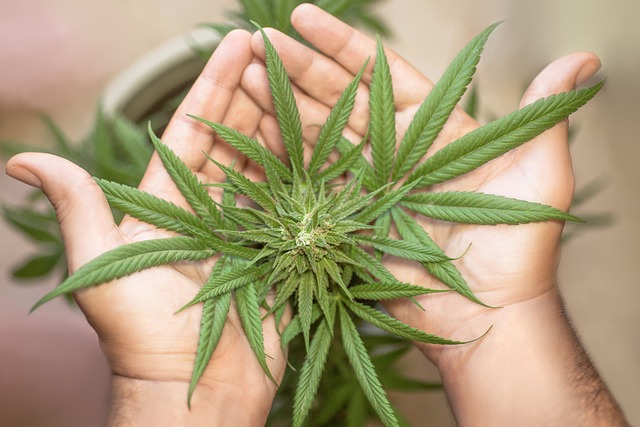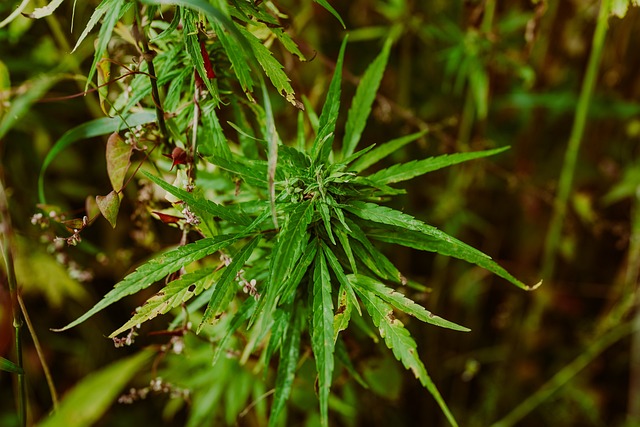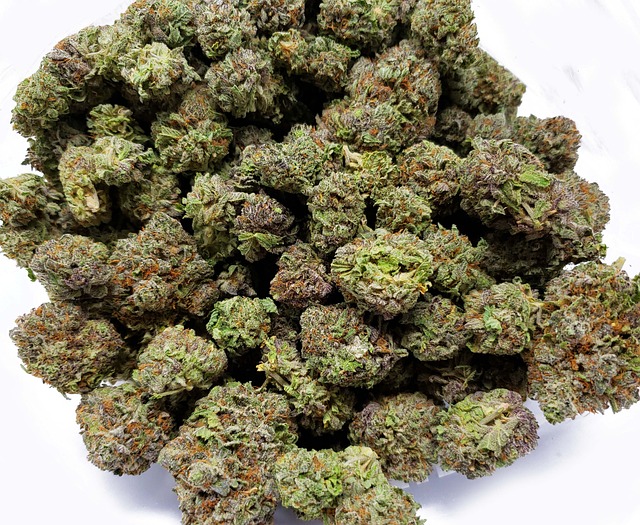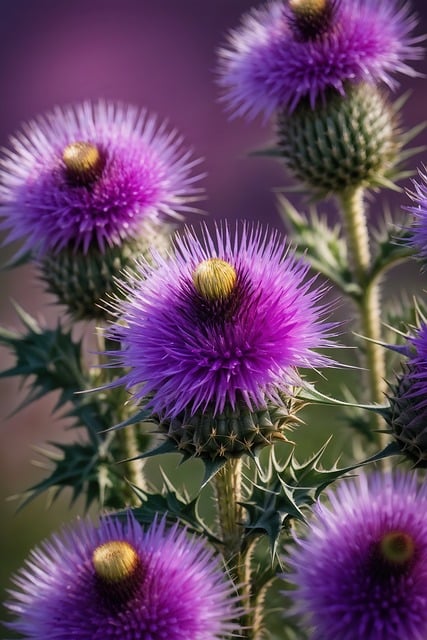In Illinois, THCA (Tetrahydrocannabinolic Acid), a non-psychoactive cannabinoid found in raw cannabis plants, has become a focus for health enthusiasts and medical patients due to its anti-inflammatory, neuroprotective, and anxiolytic properties. Legally, THCA flower is now permissible under Illinois's recreational and medical cannabis programs as long as it contains less than 0.3% delta-9-THC. This legislative change has paved the way for consumers to access this form of cannabis within a legal framework, alongside a growing body of research into its therapeutic benefits, which includes potential applications in pain management, multiple sclerosis, and inflammatory bowel diseases. The state's hemp program, as defined by the Illinois Hemp Act of 2018, specifically accommodates THCA within its legal parameters. Illinois growers are now cultivating THCA-rich flowers, adhering to precise agricultural protocols to maintain the integrity and potency of THCA, ensuring that the state remains at the forefront of cannabis innovation and medical research. This development underscores Illinois's commitment to expanding access to cannabinoid therapies while maintaining a strict regulatory approach to ensure safety and legality.
Discover the intricacies of THCA flower, a non-psychoactive cannabinoid found within the cannabis plant, and its unique implications for well-being. This article delves into the legal status of THCA flower in Illinois, offering clarity for residents navigating these waters. Illinois’ progressive stance on cannabis has paved the way for cultivators to harness the full potential of THCA, a compound that precursors THC and boasts its own set of therapeutic properties. We’ll guide you through optimal cultivation techniques tailored for the region’s growers, ensuring the highest quality THCA flower. Additionally, we’ll explore the burgeoning research on the benefits of THCA, providing a well-rounded perspective on this promising cannabinoid.
- Understanding THCA Flower: A Comprehensive Overview for Illinois Residents
- The Legal Landscape of THCA Flower in Illinois: What You Need to Know
- Cultivating and Harvesting THCA-Rich Flower: Best Practices for Illinois Growers
- Exploring the Therapeutic Potential of THCA Flower: Benefits and Research Insights
Understanding THCA Flower: A Comprehensive Overview for Illinois Residents

Cannabis enthusiasts and medical patients in Illinois have a growing interest in THCA flower, which stands for Tetrahydrocannabinolic Acid. Unlike its psychoactive counterpart, THC, THCA is non-psychoactive and offers potential health benefits without the intoxicating effects. As of recent legislation updates, THCA flower is legally permissible within Illinois’ recreational and medical cannabis programs, provided it contains less than 0.3% delta-9-THC. This legal clarity has paved the way for a broader exploration of its properties and uses.
THCA is found naturally in raw cannabis plants and is precursor to THC. When heated or decarboxylated, THCA converts into THC, which then produces the characteristic high associated with cannabis consumption. However, THCA is gaining attention for its therapeutic potential, including anti-inflammatory, neuroprotective, and anxiolytic properties. Illinois residents have access to this budding substance, which can be consumed in various forms but is particularly prized in its flower form for its fresh, cannabinoid-rich profile. Understanding THCA’s legal status and its distinct effects can empower users to make informed choices about their cannabis use, aligning with Illinois’ evolving cannabis laws and the ongoing research into this unique cannabinoid.
The Legal Landscape of THCA Flower in Illinois: What You Need to Know

In recent years, the legal status of tetrahydrocannabinolic acid (THCA) flower has seen significant clarification within Illinois’s regulatory framework. As of the knowledge cutoff date in 2023, THCA, which is the precursor to THC and found naturally in hemp and cannabis plants, is legal under the state’s hemp program. The Illinois Hemp Act, signed into law in 2018, defined hemp as all parts and derivatives of the Cannabis sativa L plant, including all cannabinoids, with a THC concentration of no more than 0.3% on a dry weight basis. This legislative move paved the way for products containing THCA to be legally sold and consumed, provided they adhere to the state’s guidelines. However, it is crucial for consumers to differentiate between hemp-derived and cannabis-derived THCA products, as these may fall under different legal categories under federal and state laws. Illinois’s approach to THCA regulation reflects a broader trend in US legislation towards distinguishing between CBD and other cannabinoids derived from hemp versus those originating from higher THC content plants.
Navigating the legal landscape for THCA flower in Illinois requires attentiveness to both state and federal regulations, as well as local ordinances that may impose additional restrictions. Consumers interested in purchasing or possessing THCA flower should stay informed about any legislative changes, as laws can evolve rapidly. It is also advisable to verify the legality of THCA products at a more granular level, such as at the county or city level, where some jurisdictions may have stricter controls. Understanding the nuances of Illinois’s cannabinoid regulations is essential for legal compliance and ensures that consumers can safely and legally enjoy THCA flower within the state’s boundaries.
Cultivating and Harvesting THCA-Rich Flower: Best Practices for Illinois Growers

Cultivating THCA-rich flower requires meticulous attention to detail and adherence to the regulations set forth by Illinois’s cannabis program, which legally recognizes THCA. Illinois growers must navigate the state’s agricultural conditions and legal framework to produce high-quality, THCA-rich flowers. The cultivation process begins with selecting a strain that is known to contain significant levels of THCA. These strains should be sourced from reputable seed banks or clones from trusted sources within the state. It is crucial to maintain optimal growing conditions, including appropriate lighting, temperature, and humidity, to encourage the synthesis of THCA.
Once the plants have matured and the desired levels of THCA are achieved, harvesting must be performed with precision and care to preserve the integrity of the compound. Harvest time is critical; it should align with when the trichomes, which contain THCA, are at their peak potency. Growers in Illinois should use clean, sharp tools to cut the plants and handle them gently during the drying process to prevent degradation of THCA into other cannabinoids like THC. Drying should take place in a well-ventilated, temperature and humidity-controlled environment to ensure even drying and continued THCA preservation. Subsequently, proper curing techniques will further protect the THCA from degrading while enhancing the flower’s flavor and efficacy. Adherence to these best practices is essential for Illinois growers looking to produce high-quality THCA-rich flowers within a legal framework that supports both agricultural excellence and patient care in the state’s medical cannabis program.
Exploring the Therapeutic Potential of THCA Flower: Benefits and Research Insights

THCA, or Tetrahydrocannabinolic Acid, is a cannabinoid found in the Cannabis sativa plant that has garnered attention for its potential therapeutic properties. As of the current regulations, THCA-rich flower is legal in Illinois, provided it contains less than 0.3% delta-9-THC, the psychoactive form of the compound. This legality allows researchers and consumers to explore the benefits of THCA, which some studies suggest may offer anti-inflammatory, neuroprotective, and analgesic effects without the psychoactive “high” associated with its decarboxylated form, THC.
Research into THCA’s therapeutic potential has been growing, particularly in the realms of pain management, multiple sclerosis, and inflammatory bowel diseases. Preliminary studies indicate that THCA may help alleviate symptoms like muscle spasms associated with MS, as well as reduce intestinal inflammation and improve gut barrier function in IBD patients. The anti-inflammatory properties of THCA are also being investigated for their role in reducing pain and inflammation, suggesting a wide range of applications in the medical field. As research continues to evolve, the understanding of THCA’s efficacy and safety profile is expected to expand, offering new avenues for treatment and relief for various conditions. The current legal status of THCA flower in Illinois provides a unique opportunity to study these benefits within a regulated environment, potentially leading to more widespread acceptance and application of cannabinoid therapies.
Illinois residents interested in the therapeutic potential and cultivation of THCA-rich flower now have a clearer understanding of its legal status, benefits, and best practices for growth. As the discussion on THCA’s legal standing in Illinois evolves, it’s clear that this compound holds promise for various wellness applications. Illinois growers equipped with knowledge from the cultivation section can confidently pursue the sustainable production of THCA flower, contributing to a market that is increasingly attuned to the nuances of cannabinoid-based therapies. With ongoing research set to further illuminate the properties and effects of THCA, the future for both patients and producers within the state looks promising.
